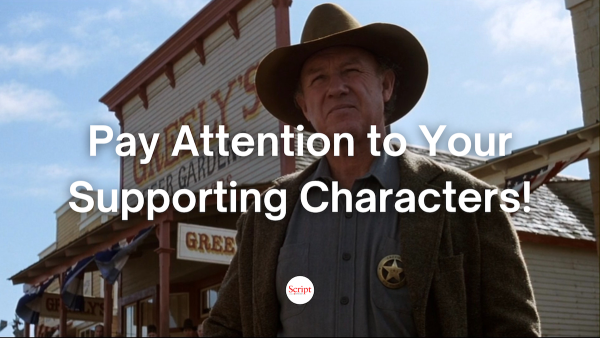BALLS OF STEEL™: How to Get Your Screenplay Read Without Asking
Continuing the dialogue of getting a screenwriting mentor, Jeanne Veillette Bowerman shares how to get your screenplay read without asking.
Continuing the dialogue of getting a screenwriting mentor, Jeanne Veillette Bowerman shares how to get your screenplay read without asking.
Jeanne Veillette Bowerman is the Editor of Script magazine and a screenwriter, having written the narrative feature adaptation as well as the 10-hr limited series of the Pulitzer Prize-winning book, Slavery by Another Name, which was honored in the Top 25 Tracking Board Launch Pad Features Competition, CS Expo Finalist, the Second Round of Sundance Episodic Lab, and as a PAGE Awards TV Drama Finalist. Follow Jeanne on Twitter @jeannevb.
Last week, after giving you the secret to finding a screenwriting mentor, where I shared my experience of how I attracted the professional screenwriting mentors in my personal network, my inbox quickly flooded with the question…
How did you get Unknown Screenwriter and Doug Richardson to read your script without directly asking them?
The short answer: They knew I could write.
That’s it. The big secret. Have a nice week.
Wait. I hear someone yelling, “But how did they know you could write?”
Not one to waste time, I went straight to Doug Richardson and asked him.
I could tell three things from your blog:
A. You had something to say.
B. You could organize your thoughts.
C. You had the skill to engage me.
Bottom-line: If you want people to feel comfortable asking to read your work, you need to earn their respect to make them believe in you. The best way to achieve that is to consistently behave in a manner that instills confidence in your abilities.
Double Duty Communication
If you want to get your screenplay read, give professionals a way to know you as a writer and as a person. In social media, blog posts, and in all your communications, show your personality as well as your capability of writing to attract an audience.
Every single time you form a sentence, you are showing your ability to tell a story. Even now, I’m creating a story:
Protagonist: Me
Outer Goal: To get my scripts read
Conflict: The zillion obstacles between me and the executives
The protagonist has to be likable in order for the audience (a potential mentor) to want to root for them.
We are storytellers, but this is also a business. Every single thing you write is like being on a job interview. In today’s age, you have to assume your potential employer is stalking you. Why would Hollywood be any different?
Add to that the fact if someone offers to read your script, they need some sort of reassurance you aren’t insane. Be engaging, polite, helpful and show your personality. They need to feel safe asking for your work and trust that if they give you harsh feedback, you won’t bash them on social media platforms, stalk their homes, cook bunnies in their backyard or fill their email inbox with 30 emails a day, draining them of their valuable time.
Think about all the ways you communicate with someone. Your first job is to make them like you, trust you, and get a feel for your writing.
Twitter: I started small with the best editing teacher ever – Twitter. Everything about the craft of screenwriting has limitations: page count, formatting, and dialogue. If you can't convey your thoughts in 140 characters, chances are your script is going to be verbose. Beyond mastering the art of brevity in storytelling, you can tell in just a few tweets if someone is interesting or not.
Facebook: Let’s say you connect with a potential mentor on Facebook. If you obsessively send Farmville requests, always threaten to delete your Facebook account, and are nothing less than a drama queen, you’re going to get muted at the very least and “unfriended” for sure. Think before you post.
And by all means, don’t use social media if you’re drunk. If you do, delete those posts ASAP… unless they’re seriously funny and engaging. But my experience is, they aren’t. You just think they are while under the influence.
Email: The emails you send someone say so much about your writing ability. As an editor, I get tons of queries that make me scratch my head in disbelief. If you can’t write a coherent email, I guarantee you can’t write a compelling script.
Blog: Before I had my Balls of Steel column, I created a website for people to find my published clips as well as my personal ramblings. When I started creating an online presence, I never put "aspiring writer" in any of my bios. Just typing that makes me vomit in my mouth. If you write, you’re a writer. Own it. Believe it!
Doug Richardson added:
I tell actors, don't wait for them to say action in an interview. Walk in the door as the person you're playing. You're being judged on everything.
Creating a website isn’t as difficult as you might think. I use WordPress, which I highly recommend. You can find a class by Jane Friedman on Build Your Author Platform Through Blogging on The Writers Store site, and Screenwriters University offers How to Set Up and Manage a Compelling Blog by Dan Blank. I’d also highly recommend taking some freelance writing classes too. You’ll learn about querying and getting articles published online and in print. The wider you cast your net, the more people who will read your words. (Added perk: Because I used WordPress to operate my own website, I as prepared to submit articles for Script Magazine when I first started writing Balls of Steel, as well as further prepared for becoming the editor.)
Believe
You can learn how to write, and you can learn social skills, but the much more difficult task is believing in yourself, let alone finding someone who believes in you.
Unknown Screenwriter shares his thoughts…
I think we all have a little trouble here and there when it comes to believing in ourselves. It can really help when someone else believes in us. Sometimes? That's all it takes.
Having the courage to put your words into the Universe requires a blind faith in yourself. If you don’t make it easy for potential mentors to connect with your words, you’ll only make it harder for yourself to succeed. The first step is to write in any and every medium you can. The path to success is long and winding. You never know what project is the one that will get you noticed.
The second step is believing in yourself enough to hit the "publish" button. If you believe in yourself, others will too. Earning the respect of accomplished writers takes time and patience. But if you do the work, you will get noticed.
If after doing the work of putting yourself out there, no one comes to read your scripts, there's still the tried and true method of hiring a script consultant. Sometimes we gotta pay for our mentorships, especially in the beginning stages of our careers.
To get more tips on how to find a champion, make sure to read Balls of Steel: The Secret to Finding a Screenwriting Mentor
No Agent? No Problem. Learn how to sell your TV show without one!
Selling Your TV Show Without Representation On-Demand Webinar
Jeanne Veillette Bowerman is a Senior Executive at Pipeline Media Group and Book Pipeline, Editor-in-Chief of Pipeline Artists, Director of Symposium—a year-round conference in the arts, co-host "Reckless Creatives" podcast, partner at Fringe Press, former Editor-in-Chief of Script magazine and a former Senior Editor at Writer's Digest. Recognized as one of the "Top 10 Most Influential Screenwriting Bloggers," her "Balls of Steel" column was selected as recommended reading by Universal Writers Program. A compilation of her articles is now available at The Writers Store—Balls of Steel: The Screenwriter's Mindset. She is also Co-Founder and moderator of X's weekly screenwriters’ chat, #Scriptchat, and wrote the narrative adaptation of the Pulitzer Prize-winning book, Slavery by Another Name, with its author, Douglas A. Blackmon, former senior national correspondent of The Wall Street Journal. More information can be found on her website. X: @jeannevb | IG/Threads: @jeannevb_ | BlueSky: @jeannevb.bsky.social







